By sharing his own painful story Steve Smith has helped save the lives of two young men
When Steve Smith began touring schools to talk about the private hell he suffered in the wake of Sandpapergate, he never believed the impact he would have on those listening to his words.
Cricket
Don't miss out on the headlines from Cricket. Followed categories will be added to My News.
It’s difficult to keep count of the number of times Steve Smith has saved Australia on the cricket field.
But no matter how mighty his feats might be with a bat in hand, they will never compare to the day he saved two young men from taking their own lives.
It was a Friday, just a few weeks removed from the ball-tampering scandal last year, when Smith attended a state high school in Sydney’s suburbs with Gus Worland and his Gotcha 4 Life suicide prevention charity, to tell the story of how his life had fallen apart.
A couple of hours later, the call came.
Two boys had been acting strangely in the playground after Smith’s talk and appeared anxious as they brushed away the inquiries of teachers.
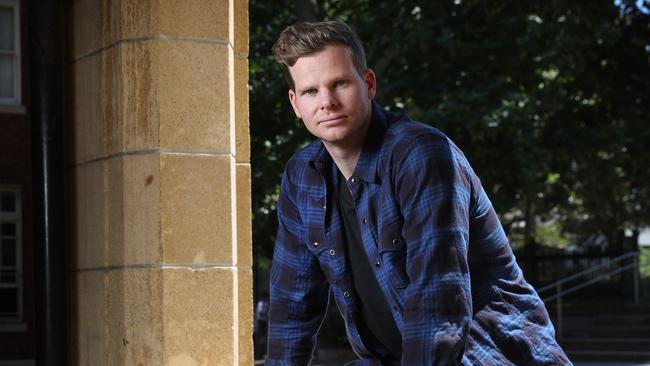
That was before they summoned the courage to separately walk into the principal’s office and confess plans they had both made to take their own lives that weekend.
Smith remembers not being able to stop himself from shaking.
“I was actually driving and I had to pull over and just take a minute to digest what had been said,” Smith tells The Saturday Telegraph.
“Gus gave me a call and said, ‘off the back of your chat, two kids have gone into the office and want to get help.’
“They had some pretty bad thoughts going on in their mind and they wanted to get some help now.
“It was one of my first chats out at a school. And it was like, ‘wow. This is really powerful and it can really make a difference.’”
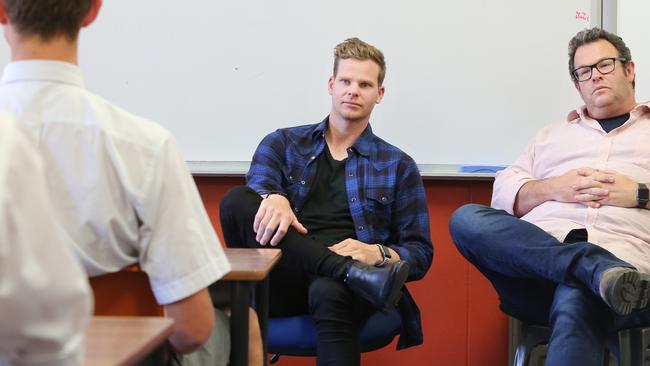
DEALING WITH HIS DEMONS
In front of a captive teenage audience, Smith opened up about how he couldn’t stop crying for the first few days after Sandpapergate. How he lay awake at night. About the trauma of having to turn up at the Newlands ground to finish the Test match that had shattered his reputation.
About the pain of sitting in a backroom at Sydney airport watching junior teammate Cameron Bancroft’s press conference from Perth on a television screen, before stepping out to bare his own soul to the world.
But Smith spoke of how, even at rock bottom, there is hope.
Until his talk, the parents and family of the boys, and the school – which The Saturday Telegraph has elected to keep anonymous – knew nothing of what the two boys were going through, let alone their tragic plans to commit suicide a day or two later.
“Steve’s presence was the absolute trigger for them to (tell the school),” says Worland.
“When the information came through, it was complete silence. I said to Steve, ‘that’s probably the most powerful thing you can do.’”
In the weeks that followed, another of the 25 high schools Smith has now addressed, reported that after listening to the fallen Test captain, a boy went home and came out to his father about his homosexuality.
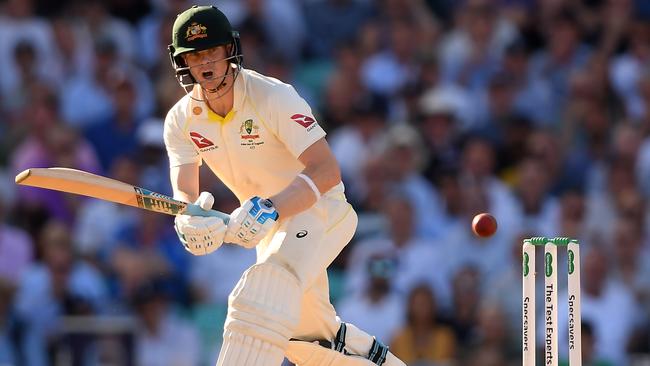
Others were inspired to reveal they were being bullied.
One boy had the courage to come forward and confess he couldn’t cope with the pressure of the private college he was attending, and just wanted to go to the local school around the corner with his mates. He had dreaded letting down his parents until he heard Smith’s story.
“Hearing that kind of feedback early on drove me to want to do more,” says Smith.
“It was hard to digest straight away hearing, ‘geez, some kids have really taken in your chat and want to get help.’ It was sad, but it made me feel that I was helping and that I was able to make a difference.”
SMITH MOVES ON FROM SCANDAL
Smith’s name will forever be linked to one of the greatest scandals in the history of Australian sport, but he believes he is better for it.
“It’s helped me grow up a bit and grow as a person,” he says.
“When something gets taken away from you that you love so much, it builds your character and makes you think about things differently.
“Now that I am back playing I’m loving it now more than ever and it probably shows out in the middle.
“I’m smiling a lot more and just enjoying what I’m doing. I’m embracing every sort of situation.”
Smith’s initial decision to involve himself in Gotcha 4 Life and also the Sony Foundation, for whom he will open a new You Can Centre in Brisbane next week for sick and disadvantaged youth, was of course in a large part due to Cricket Australia’s requirement that the three cricketers banned for 12 months each complete 100 hours of community service.
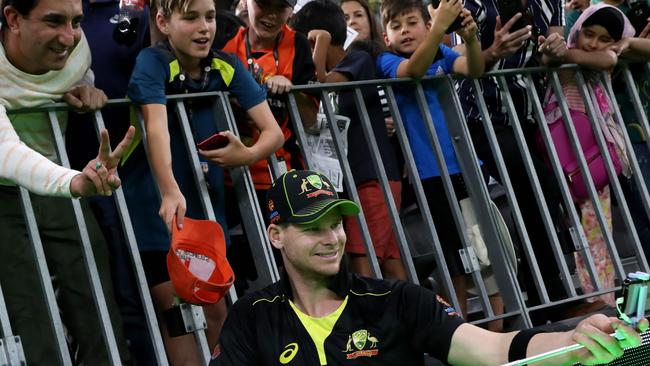
Suddenly he had time on his hands, however Smith is man enough to acknowledge now that life in the bubble as one of the country’s most in-demand sportsmen should never have been an obstacle.
“It wasn’t really about having that extra time, it was probably not making the time before to go out and do these kind of things,” says Smith.
“Denis Handlin from the Sony Foundation is a good man and has been a big supporter of mine, helping me as much as he could. I really admire what the foundation does for young cancer patients. It’s eye-opening to hear what people go through.
“It’s why I wanted to get involved in Gotcha 4 Life and getting that feedback meant a lot to me.
“I do make the time now, and it’s something I’ll try and do more often, just seeing the results we’re getting.”
EPIDEMIC FACING YOUNG MEN
Even with his ban over and his epic Ashes redemption complete, Smith was at Shore school on Friday telling his story. Just like he turned up at Baulkham Hills High School a couple of weeks after returning from England.
“Obviously he had been through a very traumatic situation and he decided to do something about it, and all of a sudden it was a moment in Steve’s world where it all resonated with him that: ‘If I’m open, honest and vulnerable, I’m actually going to make quite an impact here,’” says Worland.
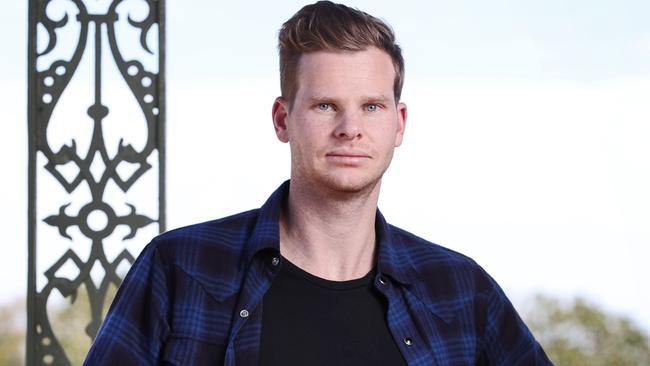
“Every single school at some stage has got back to me saying things the boys didn’t have the guts to talk about like sexuality, bullying, the pressure coming from parents and teachers, and all the unhealthy stuff going on in their lives – (that) ‘if Steve can talk about it, so can I.’
“He probably didn’t realise going out to these schools was going to be as important for him as it was going to be for the boys listening. I think that’s when the penny dropped.”
Six males between the ages of 15 and 44 take their own lives every day.
Bringing that statistic down is proving harder than conquering any of Sir Donald Bradman’s cricketing feats.
Steve Smith’s life has and still does revolve around cricket.
In South Africa 18 months ago it was perhaps to his detriment. But in his return from rock bottom, Smith is motivated in part by a greater cause.
And Worland can report that the boys at the suburban high school who had their lives turned around by Smith’s words, are also ‘OK’.
If this article has raised any issues for you please contact Lifeline 13 11 14 or Beyond Blue 1300 22 46 36.
